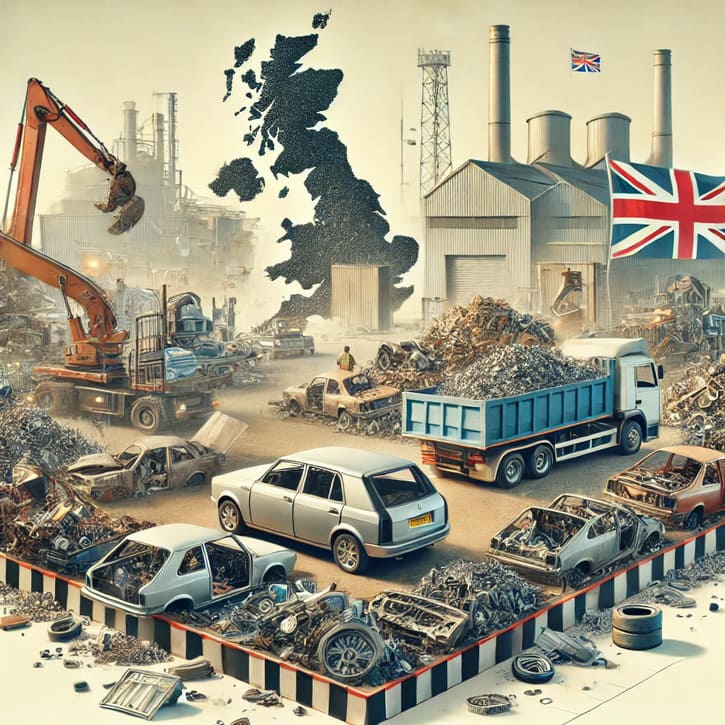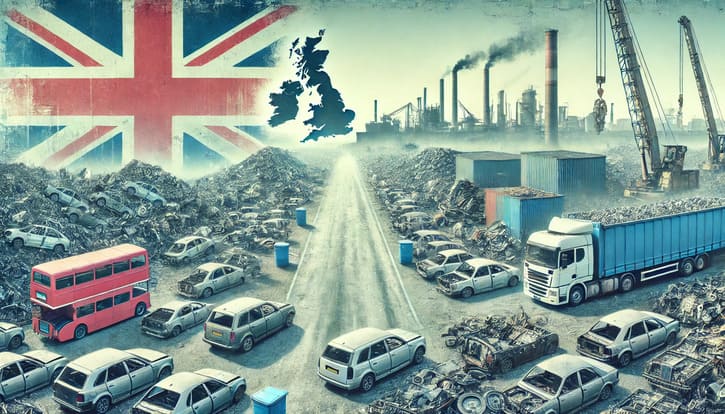Have you ever thought about what happens to cars when they’ve reached the end of their life? We see them on the road for years, but when they’re no longer roadworthy, where do they go? In the UK, these old cars don’t just vanish. In fact, scrap cars have a surprisingly big impact on the economy. If you’re curious about how a broken-down vehicle can contribute to the country’s finances, keep reading!
What is a Scrap Car?
First things first, let’s talk about what qualifies as a scrap car. You’ve probably heard the term before, but what does it mean? A scrap car is one that’s no longer useful. It could be damaged beyond repair, too expensive to fix, or simply too old. When the cost of maintaining a car outweighs its value, most people choose to scrap it.
These cars end up at scrapyards, where they’re broken down, and their parts are recycled. This process involves removing hazardous materials like oil, fuel, and batteries before crushing the metal body of the car. The materials that can be reused, like steel, are sold, while the rest is safely disposed of.
Learn more about the recycling process in our beginner’s guide to scrapping cars.
The Recycling Process and Why it Matters
You might be wondering, why scrap cars instead of leaving them to rust? The answer lies in recycling. Cars are full of materials that can be reused, and that’s where their value lies. Metals like steel and aluminium are some of the most recycled materials from scrap cars, and they can be used again in manufacturing new cars, construction, and even appliances.
Recycling scrap cars saves raw materials and reduces the need for mining. Mining, as we know, has a negative impact on the environment. By using existing materials, companies can reduce the energy needed for production, lowering their carbon footprint. It’s not just about keeping old cars out of landfills; it’s also about making the most of the resources we already have.
Creating Jobs in the Scrap Industry
One of the biggest economic impacts of scrapping cars in the UK is the jobs it creates. From the scrapyards themselves to transportation, dismantling, and recycling facilities, there’s a whole industry dedicated to handling end-of-life vehicles. You’ll find people working as dismantlers, metal sorters, and even in administrative roles, managing the paperwork involved in scrapping cars.
This industry supports thousands of jobs across the country. Not only does it provide work for those directly involved, but it also creates indirect employment. For example, companies that supply equipment to scrapyards or businesses that buy recycled materials rely on this process. So, while it may seem like a small part of the economy, the scrap industry has a wide-reaching effect.
Revenue from Recycled Materials
The UK benefits from the revenue generated by selling recycled materials. Steel and aluminium are valuable commodities, and scrap cars provide a steady supply of these metals. Once the usable materials are recovered, they’re sold to manufacturers who use them in their products. The recycling industry, therefore, isn’t just about waste management; it’s a thriving sector that brings in significant income.
This revenue helps boost the economy in several ways. It provides funding for local businesses, supports infrastructure projects, and even contributes to exports. The UK exports a large amount of recycled steel and aluminium to countries around the world, helping to strengthen trade relationships and boost economic growth.
Environmental Savings and Economic Benefits
Let’s not forget about the environment. While it’s easy to focus on the direct financial impact, there’s an indirect economic benefit to reducing environmental harm. By scrapping cars and recycling their parts, the UK reduces the need for new materials, which means less mining, drilling, and overall pollution.
When businesses lower their environmental impact, they often save money. For instance, using recycled materials requires less energy than producing new ones. This translates to cost savings, which can be passed on to consumers. Moreover, companies that adopt environmentally friendly practices often receive tax incentives or grants, which further boosts their bottom line.
In turn, a cleaner environment supports tourism and agriculture, two important sectors of the UK economy. Cleaner air, water, and land make the country more attractive to visitors, while healthier ecosystems contribute to better food production. These knock-on effects may seem small at first glance, but when combined, they create a healthier economy overall.
Learn more about why you should scrap your car and its environmental benefits in our article on why you should scrap your car.
The Role of Regulations
Government regulations play a crucial role in managing scrap cars and ensuring they’re handled properly. In the UK, the End-of-Life Vehicles (ELV) Directive was introduced to reduce the environmental impact of scrapping cars. This law requires car manufacturers to design vehicles that are easier to recycle and mandates that scrap cars are disposed of in an environmentally responsible way.
Thanks to these regulations, there’s a structured process for dealing with scrap cars. This ensures that hazardous materials are dealt with safely, and valuable materials are recycled. The government also provides incentives for people to scrap their old cars, such as scrappage schemes, which encourage drivers to trade in their old vehicles for newer, cleaner models.

Scrappage Schemes: A Boost to the Economy
Scrappage schemes have been particularly effective in boosting the UK economy. You might remember hearing about these schemes during times of economic downturn. The idea is simple: offer people financial incentives to scrap their old, polluting cars and replace them with newer, more fuel-efficient models.
By doing this, the government achieves two things. First, it helps reduce the number of polluting cars on the road, which is good for the environment. Second, it stimulates the car market. When people trade in their old vehicles, they often use the money towards buying a new car, boosting sales for manufacturers and dealers. This, in turn, helps secure jobs in the automotive industry and keeps the economy moving.
For more on how scrappage schemes work and their impact on the UK, check out our article on the 2023 UK Scrappage Scheme.
A Second Life for Used Car Parts
Not all parts from a scrap car are destined for recycling. Some components, like engines, transmissions, and even tyres, can be refurbished and sold as used parts. This creates a secondary market where people can buy affordable car parts. These parts are especially useful for those looking to fix their own vehicles or for mechanics in the business of repairing older models.
This second-hand market provides economic value by keeping cars on the road for longer and saving drivers money. Instead of buying new parts, people can purchase refurbished ones, reducing demand for new products and lowering costs across the board. It’s a win-win situation: drivers get cheaper parts, and businesses profit from selling these components.
Wondering if you should scrap or salvage your car? Get more information in our post on when to scrap your car.
The Future of Scrap Cars in the UK
Looking ahead, the role of scrap cars in the UK economy is likely to grow. With increasing awareness of environmental issues and a shift towards electric vehicles (EVs), the scrapping and recycling industry is evolving. EVs pose new challenges for recyclers, as their batteries contain different materials and require specialised handling. However, they also present new opportunities for growth in the sector.
As the number of electric vehicles on the road increases, so too will the demand for recycling services tailored to their unique needs. This will create new jobs, encourage innovation, and generate further revenue for the UK economy.
Additionally, with the global push towards sustainability, there’s a growing market for recycled materials. The UK could become a leader in exporting these materials, strengthening its position in the global economy. The potential is enormous, and with the right regulations and investment, the scrap car industry will continue to thrive.
Conclusion: A Hidden Economic Powerhouse
Scrap cars might not be something you think about every day, but they’re playing an important role in the UK economy. From creating jobs to generating revenue, supporting environmental initiatives, and contributing to trade, the impact is far-reaching. The industry doesn’t just deal with waste; it recycles valuable materials, promotes sustainability, and keeps the economy moving.
As the country continues to focus on green initiatives and sustainability, the importance of recycling scrap cars will only grow. It’s a hidden powerhouse that shows how even the most unexpected industries can have a significant impact on both the environment and the economy. So, the next time you see an old car headed for the scrapyard, you’ll know it’s not the end of the road—it’s the beginning of a new chapter for both the vehicle and the UK economy.


